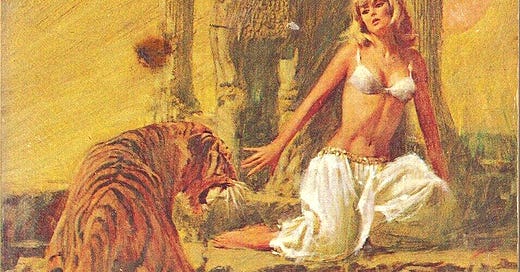Edward S. Aarons’ “Sam Durell” novels, about secret agent Sam Durell, a.k.a. The Cajun, often get compared to the legion of James Bond imitators that came in the wake of Ian Fleming’s success. Bond and Durell share a remarkable number of traits. Both Bond and Durell are expert gamblers. Both work for special “problem-solving” departments in their respective organizations (MI6 for Bond, the CIA for Durell). Both have tough bosses behind big desks (something that would become a staple of just about all spy novels). In terms of physical appearance, both men are described similarly. Durell is a little earthier, a little more rough and tumble, while Bond is a little more refined and playboyish. However, it’s unlikely that Fleming’s books were much of an influence on Aarons when he was writing his first Sam Durell novel, which came out less than a year after the initial publication of Fleming’s Casino Royale.
Born in Philadelphia, 1916, Aarons attended Columbia University, where he received a degree in history before serving as a chief petty officer in the Coast Guard during WWII (Fleming himself served in WWII for Naval Intelligence). Aarons began a steady career as a writer for pulp magazines, including contributions to The Avenger and Angel Detective, collections of stories about a Saint-style character that were also adapted for comic format by Timely (later known as Marvel) Comics. Aarons worked frequently as a mystery writer throughout the 1940s, until publishing Assignment to Danger in 1955, which introduced the character of Sam Durell.
But the dice often roll in an unpredictable fashion, and while Fleming went on (deservedly so) to become one of the most popular espionage/action novel writers of all time, Aarons’ stories — which are generally just as or even more accomplished than Fleming’s — were successful at the time of their publication but never attained the cultural cache of 007. It wasn’t a bad place to be, all things considered, and Aarons wrote some fifty or so Sam Durell books.
Assignment Moon Girl is a solid example of just how good the Sam Durell novels can be. It’s straightforward and smart. There are some twists and turns, but no real shockers. Aarons spins a streamlined action-adventure yarn that is relatively clever while still being easy to digest. When a beautiful Russian cosmonaut pops up in Iran, half out of her mind and babbling about having just returned from the moon, Durell is called in to join the race to find her. The Russians want her because she’s half Russian, and her father is a significant player in the Russian bid for a moon landing. The Chinese want her because she is half-Chinese and can potentially give them valuable information for their own space program. Certain rebel elements in Iran want her so she can be used as a bargaining chip. And Durell thinks the whole moon trip thing is a lie, but he still wants to find her first so she can be questioned and then returned to the USSR.
The assignment leads him from the streets of pre-revolution Tehran into the deserts of Iran and, so it would seem, even to the moon at one point. Aarons’ novels are heavy on action and intrigue and light on gratuitous sex and sleaze. The book does use the pulps’ beloved phrase, “proud breasts” as soon as the first page, and there is some nudity both male and female when the cosmonaut, Tanya, and later Durell himself find themselves prisoners in a tiger pit. However, there’s no sex in the book, although in classic Bond formula, the hint of a little fun to come is squeezed into the last page, as Durell decides to show a lovely former Chinese agent the glories of the free world.
The Chinese woman is a disgruntled servant of Madame Hung, a recurring character in the books and Durell’s arch-nemesis. Why are all evil Asian women called Madame so-and-so? In fact, most of the time, regardless of the race of the person, if they insist on being referred to as Madame Something, you can bet they’re probably up to something. Aarons’ description of Hung is harrowing — faded beauty twisted by age and wickedness — and although she’s slight of build and not physically imposing, Hung’s manipulation of situations to her advantage and her cruelty when she has the upper hand make her a formidable nemesis.
Aarons was also one of the more racially progressive espionage writers of the era, at least in the books I’ve read. His cast of foreign characters is always sprinkled with a few rotten eggs, but for the most part, they’re an assembly of decent and heroic characters. The Iranian officer Hanookh is a noble and dedicated hero, and the Chinese agent, despite being named Lotus and acting demurely for most of the book, is never depicted as anything less than dependable and competent. We also get a glimpse at pre-Revolution Iran, when it was the jewel of the Middle East.
The better espionage novels are always informed by such reflections on history and modern society. But such tapestries are always the backdrop for action, and Durell really goes through the wringer on this one. He’s frequently beaten, bashed on the head, and drugged. In fact, he may get smashed in the back of the head in this book almost as often as Philip Marlowe drinks scotch in Farewell, My Lovely. Like any worthwhile espionage thriller, there’s a fair amount of luck and coincidence helping Durell along, but Aarons creates a realistic framework for his story and makes the coincidences easy to accept.






Wow! As luck would have it, I just read this one, my introduction to the series. I'll be noting my thoughts in a review next month, but I quite appreciate this one. Like you, I noted the excellent local character, the lack of chauvinism, and also (for 1967) a lack of sexism. After all, Tanya starts right out as resourceful and strong.
Much better than Bond. :)